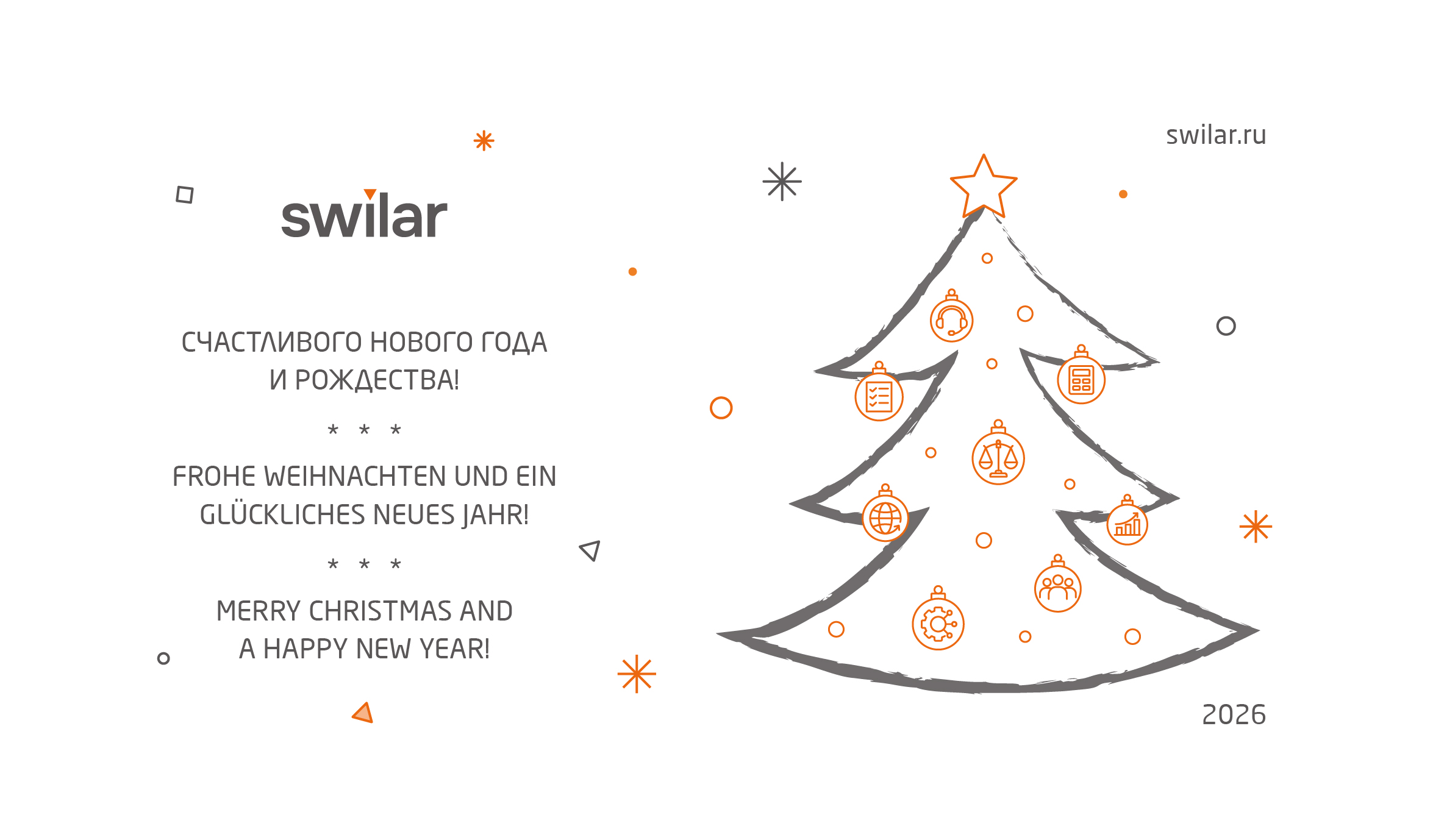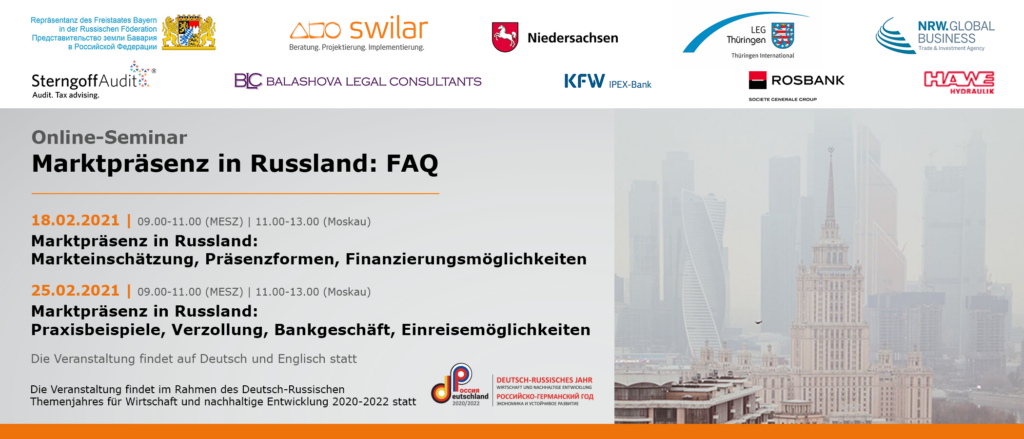Author: Mark
Latest changes in restrictions on entry to the Russian Federation
Multiple entry for highly qualified specialists allowed
According to Decree of the Government of the Russian Federation No. 258-p dd. 06.02.2021 foreign Highly Qualified Specialists (HQS) as well as their family members are allowed multiple entries into the territory of the Russian Federation.
Separately, we would like to note that in order to enter the territory of the Russian Federation these foreign citizens must be included in the list (with an indication of the checkpoint across the state border of the Russian Federation and the date of entry) sent to the Federal Security Service of Russia and the Ministry of Internal Affairs of Russia by the federal executive authority, which competence the organization – employer or customer of works (services) is.
Contacts:
Maria Matrossowa
Tatiana Ushakova
Other news

10.02.2026
Environmental Fee: what changed since January 1, 2026 and what business should expect

23.12.2025
Dear colleagues, Please accept our sincere congratulations on the upcoming New Year and Christmas!
Online seminar “Russian Market: FAQ. Day 1”

On February 18th, the first online seminar of a two-day series of events “Russian Market: FAQ” was held, bringing together entrepreneurs, business owners, and financial directors of companies that are about to enter the Russian market.
The event started with a discussion of the experience of Bavarian companies, presented by Andreas Brunnbauer and Anastasia Nosova from the Bavarian Representation Office in the Russian Federation. They gave an assessment of the current economic development of the projects and pointed out the possible help for the business from the Bavarian Representation.
Ekaterina Karpushenkova from NRW.Global Business Russia / Moscow assessed the Russian market from the perspective of North Rhine-Westphalia companies and the potential of the North Rhine-Westphalia market for Russian companies. Her report was devoted to the German-Russian cooperation in the field of research and innovation.
Daria Pogodina, the General Director of swilar, told about the important aspects of organizing a subsidiary company in Russia, and Gerts Paltsev from Sterngoff Audit focused on the issue of such companies obtaining the status of small and medium business in Russia.
Dominik Trayer, the Head of KFW IPEX-Bank, gave a talk on how German companies entering the Russian market can get bank financing.
Alexander Ryabov from Hawe Hydraulik shared the experience of changing the legal form of his company from a representative office to a Limited Liability Company (Ltd).
Thanks to the moderator Dr. Georg Schneider, the General Director of swilar GmbH, the discussion was very dynamic and informative. The participants were able to ask the experts questions and clarify details.
The event was held in the framework of German-Russian Thematic Year of Economy and Sustainable Development 2020-2022.
We thank all the participants for the productive discussion and invite them to the second event of the series on February 25th. It will be devoted to practical examples of entering the Russian market, customs clearance and banking services.
Organized by: swilar group of companies, Bavaria Representation Office in Russia, Lower Saxony Representation Office in Russia, NRW.Global Business Russia and Thüringen International
with the active cooperation of KFW IPEX-Bank and Rosbank, HAWE Hydraulik, as well as the audit company Sterngoff Audit and the law firm Balashova Legal Consultants.




Recent changes in the list of restrictions for employers of Moscow
Decree № 5-UM of the Mayor of Moscow suspends from January 27, 2021 the obligation of Moscow employers to transfer at least 30% of employees to remote work.
Decree № 5-UM of the Mayor of Moscow dd. January 27, 2021 (hereinafter – the Decree) suspends from January 27, 2021 the obligation of Moscow employers to transfer at least 30% of employees to remote work. Nevertheless, employers are advised to keep in force the measures taken on transferring employees to remote working mode.
Please note that the requirement for Moscow employers to transfer all employees over the age of 65 to remote work, as well as citizens with diseases, the list of which is determined by the Department of Health of Moscow, except for citizens whose presence in the workplace is critical, remains in force.
Also, the requirement to submit data on changes in the number of employees transferred to remote mode in electronic form using a personal account on the official website of the Mayor and Government of Moscow in accordance with clause 2.4.3. of the Decree remains in force.
Contacts:
Maria Matrossowa
Tatiana Ushakova
Other news

10.02.2026
Environmental Fee: what changed since January 1, 2026 and what business should expect

23.12.2025
Dear colleagues, Please accept our sincere congratulations on the upcoming New Year and Christmas!
Changes in the algorithm for payment of benefits for temporary disability, maternity and childhood
The Ministry of Labor and Social Protection of the Russian Federation has prepared a draft of amendments to Federal Law № 125-FZ dd. 24.07.1998 and Federal Law № 255-FZ dd. 29.12.2006, which will come into force from January 1, 2021 in terms of payment of benefits for temporary disability, maternity and childhood.
“Direct payments” is a project implemented by the Social Insurance Fund of the Russian Federation since 2011. During this time, 77 regions of the Russian Federation have already joined it. The remaining 8 largest regions (Moscow, St. Petersburg, Krasnodar and Perm, Moscow, Sverdlovsk and Chelyabinsk regions, the Khanty-Mansi Autonomous District) will move to direct payments from January 1, 2021.
Thus, the system of “direct payments” will be effective throughout the Russian Federation from January 2021.
The point of the amendments is that from 1 January 2021 all benefits (with few exceptions) will be paid directly to employees by the Social Insurance Fund (FSS).
Besides, employers will transfer insurance payments to FSS (including contributions for accidents at work and occupational diseases) in full, i.e. without reducing the amount of benefits paid to employees.
Direct payments of employee benefits from the Social Insurance Fund, which are considered in the draft, include:
- temporary disability allowance (including in the case of an accident at work and (or) occupational disease);
- maternity allowance;
- one-time allowance for women who have registered at medical institutions in the early stages of pregnancy;
- one-time allowances upon the birth of a child;
- monthly child care allowance;
- payment of leave (in excess of the annual paid leave) to an insured person who was injured at work.
Temporary disability benefits for the first 3 days of an employee’s illness will be assigned and paid, as before, only by the employer.
With subsequent reimbursement from the Social Insurance Fund, the employer will assign, and pay to working citizens the following types of benefits (the mechanism remains the same):
- payment of 4 additional days off to care for children with disabilities;
- funeral allowance;
- payment of temporary disability benefits from inter-budgetary transfers (to persons exposed to radiation).
The mechanism of direct payments is as follows:
1. The employee must submit to the employer:
-
a certificate of the amount of earnings (if he/she worked for other (other) employers during the calculation period);
-
confirming documents (certificate of disability for work, certificate of registration at a medical institution in the early stages of pregnancy, certificate of birth of a child, etc.);
-
application, wh ere details for the transfer of the allowance are specified.
Please be awared, that allowance will be paid by FSS only to the card of payment system MIR.
Important! The term for submission of the sick leave and other documents confirming the occurrence of an insured event is 6 months after the sick leave is closed.
2.The employer within 5 calendar days sends a package of documents to the FSS.
3. The FSS within 10 calendar days checks the documents provided by the employer and makes a decision on the assignment or refusal to pay the allowance.
4. If the decision is positive, the allowance is transferred to the employee’s current account or sent by mail.
5. If the documents are insufficient or incorrect, the FSS sends a notification to the employer. Within 5 calendar days the insured is obliged to replace them, or provide the missing documents.
The way of sending data to the FSS depends on the average number of employees:
- 25 people and more – the documents, including the register of information, are sent to the FSS digitaly;
- 24 people and less – the documents, including the inventory, can be sent to the FSS both digitaly and on paper.
The amount and methodology of benefit calculation remain the same.
Monthly child care allowance awarded in 2019-2020 and continuing into 2021 are paid as follows:
-
The employer pays the December 2020 allowance to the employee in the regular order;
-
To process an allowance payment from 2021 directly from the FSS:
· the employee must submit to the employer an application for the allowance directly from the regional branch of the FSS in the standard form and the necessary documents;
· the employer within 5 calendar days is obliged to transfer the data (inventory, application and documents from the employee or register) to the FSS.
The monthly child care allowance will be transferred from the 1st to the 15th of the month following the month for which the allowance is paid. The allowance for care of the child till 1,5 years at transition to direct payments from FSS, is not subject to recalculation, the sum of the allowance appointed till 01.01.2021, does not change.
We will be happy to answer your questions!
Contacts:
Natalia Safiulina
Ekaterina Babenko
Other news

10.02.2026
Environmental Fee: what changed since January 1, 2026 and what business should expect

23.12.2025
Dear colleagues, Please accept our sincere congratulations on the upcoming New Year and Christmas!
Electronic visas to St. Petersburg and Leningrad region from October 1, 2019
According to the government decree of September 26, 2019 “On establishing the specifics of issuing ordinary single-entry business, tourist and humanitarian visas in the form of electronic documents and entry into the Russian Federation”, from October 1, 2019, citizens of 53 foreign countries, including Germany, can obtain an electronic visa to enter the Russian Federation through air, sea, road and pedestrian checkpoints located in the territories of St. Petersburg and the Leningrad Region. Entry by rail is currently not provided. An electronic visa is issued through an application completed on the official website of the Russian Ministry of Foreign Affairs: http://electronic-visa.kdmid.ru/index.html. The application must be completed and sent no later than 4 days before the planned date of entry into Russia. You can track the status of your application through your personal account on the website. The notification of issuance of an electronic visa can be printed from email, from the website, or shown on a smartphone screen. The visa is issued without a consular fee, for a period of 30 days with a permitted stay in the country of no more than 8 days.
Electronic visas are valid for entry through the following checkpoints:
Air checkpoint “Pulkovo”;
Sea checkpoints “Vysotsk”, “Big Port of St. Petersburg (Sea Terminal)”, “Passenger Port of St. Petersburg”;
Car checkpoints “Ivangorod”, “Torfyanovka”, “Brusnichnoe”, “Svetogorsk”;
Pedestrian checkpoint “Ivangorod”.
Single-entry electronic visas may be introduced for entry throughout the Russian Federation from 2021. According to preliminary data, the visa will be valid for up to 16 days for entry for humanitarian, tourist and business purposes.
Other news

10.02.2026
Environmental Fee: what changed since January 1, 2026 and what business should expect

23.12.2025
